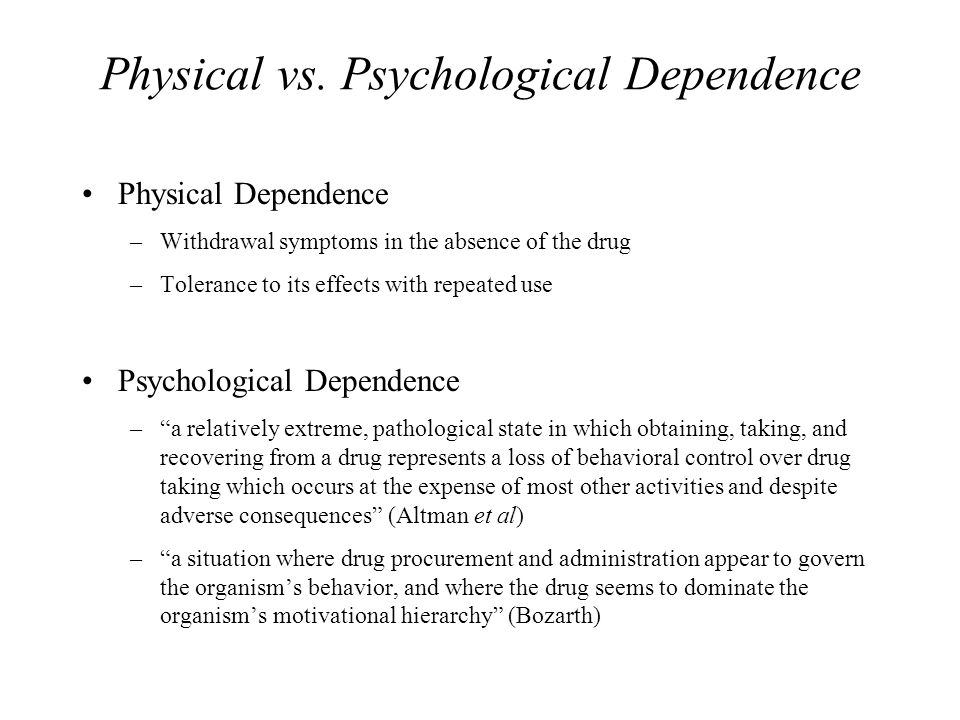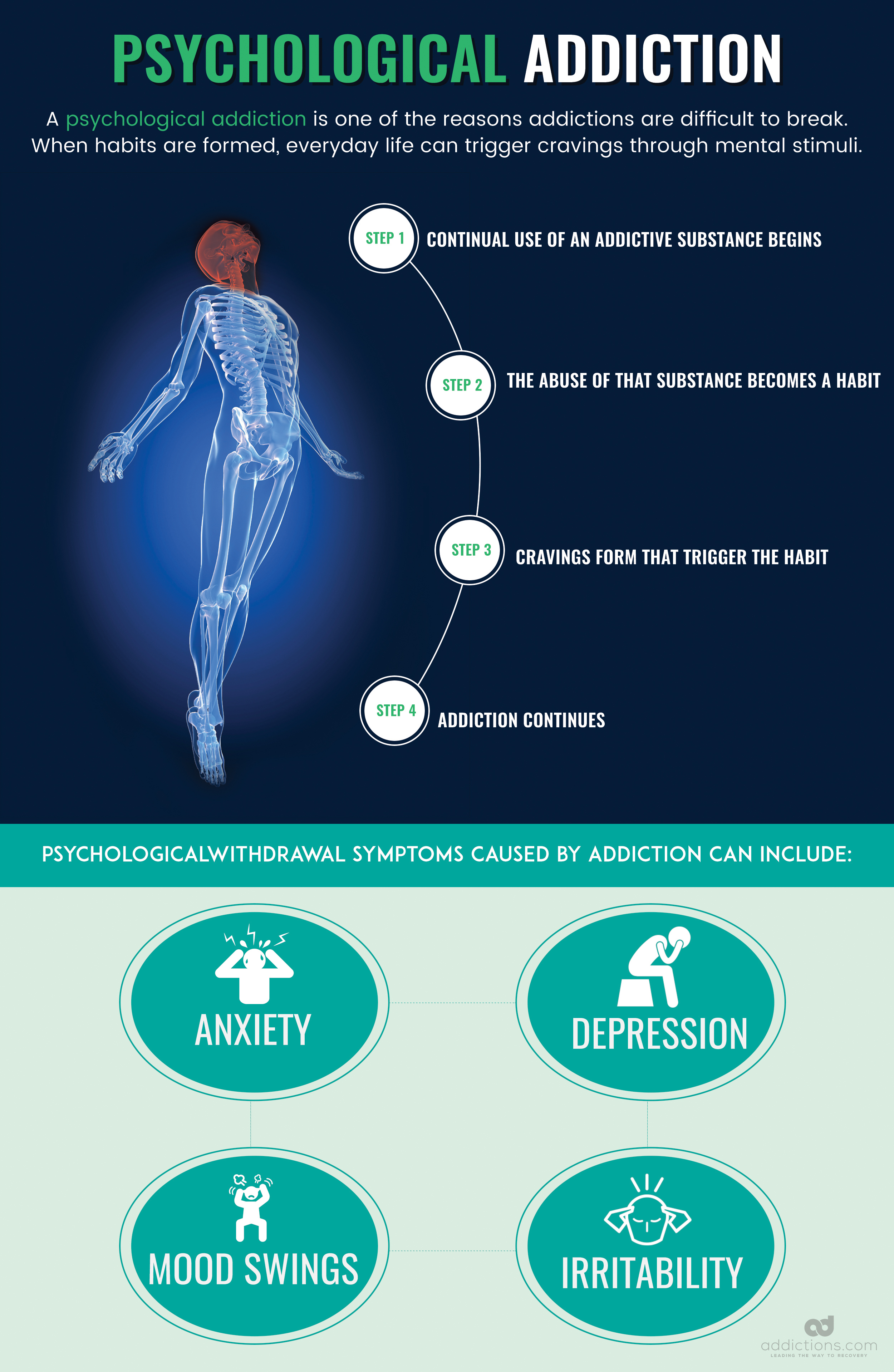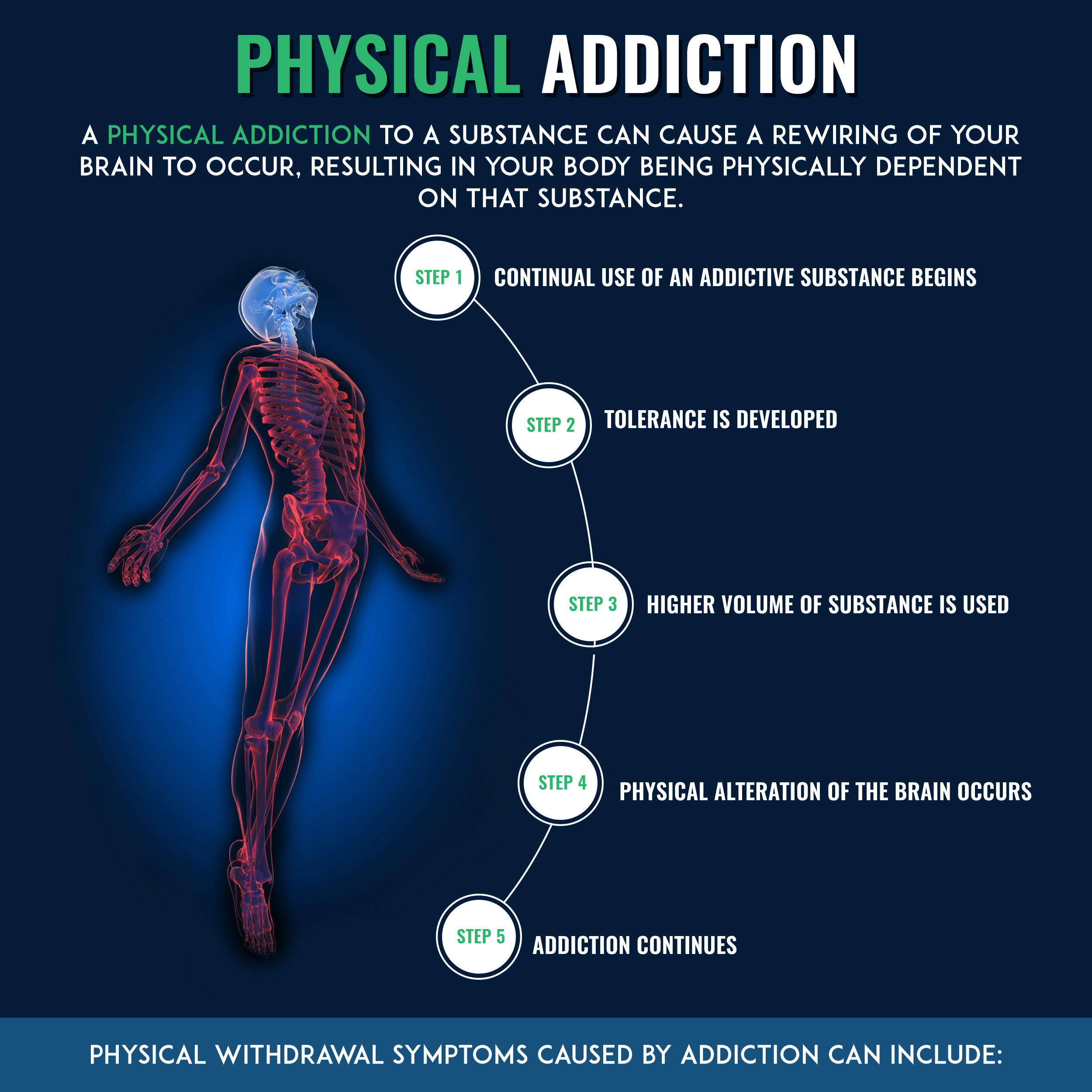Explain the Difference Between Physical Dependence and Psychological Dependence
Psychological addiction is when a person is emotionally tied to a drug based on a mental desire for it. Failure to meet work social or family obligations.

Definitions Drug Use Drug Abuse Drug Dependence Taking A Psychoactive Substance For Non Medical Purposes Out Of Curiosity Drug Abuse Drug Use That Ppt Video Online Download
In psychological dependence when a person takes a drug behavioral act they receive a consequence such as a feeling of euphoria perhaps.

. Along with this comes the physical need for more and more of a drug to get the desired high. Psychological dependence is associated with numerous emotional and cognitive symptoms whereas physical dependence is typically associated with the development of tolerance and withdrawal symptoms that are not primarily emotional or cognitive in nature. Thats why physical dependence requires a medical detoxification process to slowly wean the body off the substance.
This facet of addiction can occur even if the person doesnt display physical dependency symptoms. Physical dependence Psychological dependence. Psychological addiction can be defined as the psychological dependence on a substance.
In physical dependence when a person stops taking the drug a set of physiological symptoms will appear as the drug level in the system drops withdrawal. The psychological side of addiction represents the compulsion of the mind to drink or use based on a perceived need the substance fills. With both physical and psychological addiction more clearly defined it is easy to see the differences between the two.
Dependence refers strictly to a physical need for a substance. While physical dependence is associated with substance use disorders this does not always happen. Marijuana is often classified as a non-physically addictive substance.
Many people who take a prescription medicine every day over a. Psychological Addiction Is More Difficult to Understand. The difference between physical and psychological dependence is physical dependency affectsones body and psychological dependency affects ones behavior.
The Difference Between Physical and Psychological Addiction. Though dependence and addiction are often used interchangeably they arent the same thing. While yes many times an individual who is physically dependent on a substance will suffer from the illness known as addiction this is not always the case.
The influences behind substance use disorders. Addictionor compulsive drug use despite harmful consequencesis characterized by an inability to stop using a drug. Experts are tested by Chegg as specialists in their subject area.
Explain the difference between physical dependence on a drug and psychological dependence on a drug. Dependence means that when a person stops using a drug their body goes through withdrawal. Psychological addiction revolves around ones behavior and is defined as a compulsion or.
Symptoms disappear when the drug is taken again. Psychological dependency is defined as dependence on a substance. Is There a Difference Between Physical Dependence and Addiction.
Addiction refers to biochemical changes in the brain that lead to psychological and sometimes physical reliance on a drug. Many people would be surprised to know that physical dependency does not equal addiction. The latter reflect physical dependence in which the body adapts to the drug requiring more of it to achieve a certain effect tolerance.
Psychological dependence is an emotional craving or desire for the substance causing you to feel like you need it. Psychological substance dependence refers to the users perceived need for a. Long-term drug or alcohol use leads to a state of physical dependence where your bodys cells cant seem to function normally without that substance.
For example physical dependence features symptoms that can make a person ill while psychological addiction creates persistent and often intense urges to use substances to satisfy those urges. However addiction affectsboth ones mind and ones body. A group of physical and mental symptoms that can range from mild if the drug is caffeine to life-threatening such as alcohol or opioids including heroin and prescription pain relievers.
We review their content and use your feedback to keep the quality high. While physical addiction is commonly associated and interwoven with psychological addiction this isnt always the case. Addiction on the other hand is a behavioral syndrome characterized by the compulsive and repeated seeking out psychological dependence or usage of a drug in spite of negative physical psychological andor social consequences.
Even if you dont show symptoms of physical dependence your mind might make you believe you need drugs or alcohol. There are nuances in the meanings of addiction and dependence but many in the medical community use the terms interchangeably. Psychological dependence is indicated by withdrawal symptoms such as anxiety dissatisfaction.
For example marijuana is often classified as a non-physically addictive substance. As mentioned above can develop an addiction to various things such as drugs alcohol gambling video games sex and eating among others. Symptoms of psychological dependence include.
An individual is physically addicted to drugs and alcohol when they require these substances to avoid cravings nausea and other withdrawal symptoms. Strong and deep desire for drugs or alcohol. And sometimes depending on the drug tolerance and withdrawal.
Dependence is more of a physical reliance on drugs or alcohol while addiction involves emotional mental and physical dependence on the substance. Who are the experts. For instance a person who goes in for a particular surgery that results in.
Substance use experts classify it as psychologically addictive. This problem has been solved. The definition of physical dependence refers almost exclusively to the physical ramifications of addiction characterized by the symptoms of tolerance and withdrawal.

Difference Between Physical And Psychological Addiction
No comments for "Explain the Difference Between Physical Dependence and Psychological Dependence"
Post a Comment